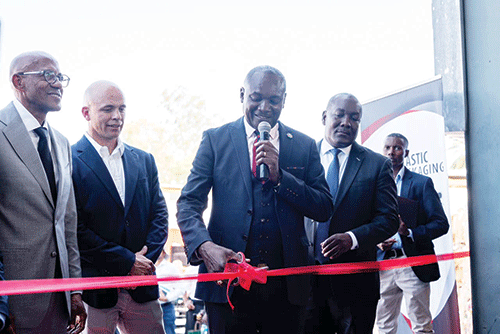Rudolf Gaiseb
Namibia Polymer Recyclers (NPR), a subsidiary of Plastic Packaging and Coca-Cola Beverage Africa (CCBA) Namibia, last week launched a PET Flake Plant in Okahandja.
The Polyethylene Terephthalate (PET) flaking plant constitutes an investment of N$24 million, and recycles discarded beverage bottles.
The bottles are recycled by shredding them into PET flakes, which have an international market value.
Through this venture, CCBA aims to address the issue of plastic waste, as they have opted to be part of the solution to achieve a more sustainable future for the planet.
Environment minister Pohamba Shifeta said the completion of the cutting-edge recycling facility will enable NPR to recycle up to 500 tonnes per month.
“The impact of improper waste management and the proliferation of plastic waste on our environment cannot be overstated. From polluting our oceans and harming marine life to contributing to greenhouse gas emissions and land pollution, the consequences of our wasteful habits are far-reaching and damaging,” he said at last week’s opening.
Shifeta said by doubling the capacity of mechanical plastic waste recycling, the pressing issue of plastic pollution as well as unlocking economic opportunities for the nation is addressed.
At last week’s plant opening, chief public affairs, communication and sustainability officer of CCBA Tshidi Ramogase noted that Coca-Cola has embarked on a ‘World Without Waste’ strategy in 2018 to drive systematic change through a circular economy for packaging.
“Our aim is to make 100% of our packaging recyclable globally by 2025, and use at least 50% recycled material in our packaging by 2030,” said Ramogase.
The demand for recycled PET plastic for food-grade applications currently exceeds supply, hence the need to help build a sustainable pipeline for high-quality materials.
“We work with communities to boost PET recycling and collection; collaborate with recycling partners, and secure recycled PET to help ensure material for our bottles is used again and again. This is an example of how partners across business, government and civil society can support or create closed-loop systems to ensure our packaging is collected, recycled or reused. We’re leveraging our scale and reach to achieve our sustainability goals and reduce packaging waste,” Ramogase added.
The recycling process entails different stages, including PET bottle sorting, shredding into PET flakes, as well as hot-washing and drying of the flakes, which are then sent for further processing into recycling PET pellets and other end-uses.
Chairman of plastic packaging Frank Fredericks said the environmental ramifications of PET waste are dire, with overflowing landfills and ocean pollution being just the tip of the iceberg.
He emphasised that the effects are felt throughout the economy and environmental levies are imposed to reduce tourism activities due to environmental degradation.
“Yet, in the face of these, we find hope and opportunity in recycling. Recycling PET bottles not only diverts waste from landfills, but also generates economic value. Not only are we reducing the negative effect of litter in our environment, but the multiplier effect is achieved by creating jobs and earning forex by exporting our products. By recycling PET bottles, we contribute to the growth of the recycling industry by stimulating innovation and investment in green technologies,” said Fredericks.
He continued: “Without an import permit from South Africa, it is impossible for Namibia to export baled PET to SA, which automatically reduces the value of PET to zero dollars.”
“With this investment, no import permit will be needed to export the hot-washed flakes to any country across the globe. Thus, creating this infrastructure to have an offset for baled PET in Namibia creates sustainable value for baled PET waste. Investing in recycling initiatives will not only safeguard our environment but also bolster our economy for future generations,” Fredericks added. -rrgaiseb@gmail.com


